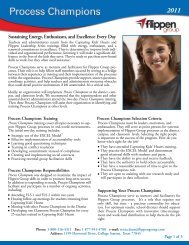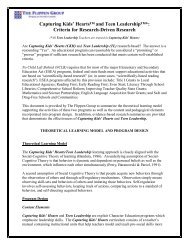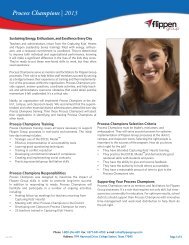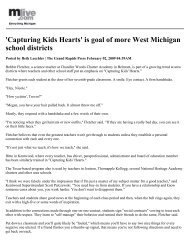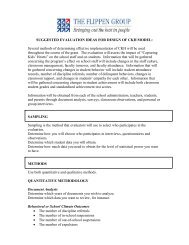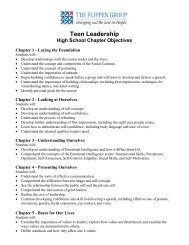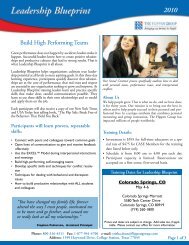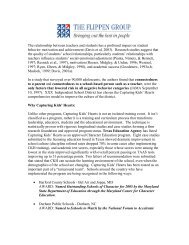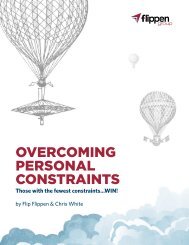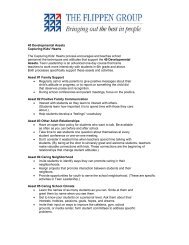Smart & Good High Schools - The Flippen Group
Smart & Good High Schools - The Flippen Group
Smart & Good High Schools - The Flippen Group
- No tags were found...
You also want an ePaper? Increase the reach of your titles
YUMPU automatically turns print PDFs into web optimized ePapers that Google loves.
CHAPTER 3: <strong>The</strong> Ethical Learning Communityjob. <strong>The</strong>se books were to be gifts to the seniors, gifts thatmight become precious heirlooms. <strong>The</strong>y wanted critique andhelp from everyone. <strong>The</strong>y read the final drafts of their openingparagraphs aloud to the whole class for suggestions.<strong>The</strong>y labored, draft after draft, over the cover designs. <strong>The</strong>ywanted their books to be perfect.“In this school everyone cares aboutmy work. I have to try much harder.”A 6th-grade girl at Berger’s school was asked by visitorsfrom a foundation how this school differed from her previousone. She answered:In this school everyone looks at my work. Everyone caresabout it. In my old school, only my teacher knew anythingabout my work. I have to try much harder in this schoolbecause the work is more important.Berger’s school is elementary. In secondary level classes,practical constraints such as time and curriculum pressureswould prevent all five of the pedagogical practicesoutlined above from being implemented all of the time.However, if we seek to optimize learning at the highschool level, the challenge arising from Berger’s work isthis: How likely are we to get our students to achieve theexcellence of which they are capable unless they do workthat matters, have models of excellence, experience positivepeer pressure from classmates who critique theirwork, revise on the basis of peer and teacher feedback,and have the uniquely powerful motivation that comesfrom public presentation? How else to create a genuineculture of excellence, so that doing one’s very best work isbusiness as usual—the only way to “fit in” at this school?<strong>High</strong> schools that require seniors to do an “exhibition”offer one example of a pedagogical strategy that bothdemands and supports excellence at the secondary level.An exhibition typically involves year-long originalresearch or creative work culminating in a public presentationto a jury of teachers, peers, and at least one communityexpert. In one such school, we listened to a seniorgirl present, with articulate self-assurance and hard-wonexpertise, her year-long study of the therapeutic value ofusing animals in visits to depressed and non-communicativenursing home patients. As a result of her researchand first-hand observation, she was planning to pursuethis line of work as a career.◆ Develop schoolwide support systems that hold all studentsaccountable for learning.At the same time that teachers work to create a culture ofexcellence in classrooms, there must be support systemsin place that monitor and support student achievement.<strong>The</strong>se assure at least a minimal level of academic performancefor those students who, for whatever reason,show a performance drop. For example, one large highschool we visited—the recipient of multiple awards—saidits motto was “Success for every student.” When it comesto students’ academic learning, the principal said, theschool believes there are three key questions:1. What should students know and be able to do?2. How do you know if they’ve learned it?3. What are your interventions when you find that a studenthasn’t met the learning standard?Every three weeks one high schoolsends an academic progress reportto a student’s parents, coaches,and club advisors.<strong>The</strong> principal explained:Every three weeks, a student’s academic progress reportgoes to the parent, coaches, and club advisors. Grades aresent out every six weeks. Students who are not achieving atan acceptable level have to go to special classes. Throughthese, we can monitor whether they’re getting their homeworkdone. Kids here can’t fall through the cracks.ELC 4: Take personal responsibilityfor continuous self-development.4.5ELCPromising Practice 5:Foster personal responsibility forexcellence and ethics among facultyand staff, parents, and the widercommunity.In Chapter 4, when we describe the professional ethicallearning community, we will discuss the responsibility ofall school staff to develop a personal plan for continuousprofessional growth. Here we want to focus on whatschools can do to inspire parents and the wider communityto become part of the quest for character.◆ Help parents become their best.Given the research on the importance of “family connectedness”as a factor protecting teens against high-risk behaviors,one of the most important things a school can do is tohelp parents develop communication skills for connecting51<strong>Smart</strong> & <strong>Good</strong> <strong>High</strong> <strong>Schools</strong>



